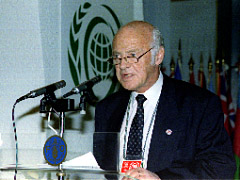


INTERNATIONAL COMMITTEE OF THE RED CROSS (ICRC) - COMITE INTERNATIONAL DE LA CROIX- ROUGE - COMITE INTERNACIONAL DE LA CRUZ ROJA | ||
Mr. Eric Roethlisberger, Permanent Vice-President, International Committee of the Red Cross (ICRC) | ||

(Statement on behalf of Mr. Cornelio Sommaruga, President of the International Committee of the Red Cross) It is humanely intolerable in today's world that hundreds of millions of people live beneath the threshold of minimal subsistence standards. The International Committee of the Red Cross (the ICRC) warmly welcomes the initiative taken by FAO in organizing this Summit, which deals with one of the most critical issues facing the world today, food security for all. The ICRC has been entrusted by the community of States with a two-fold mandate: one, to provide protection and assistance for the victims of armed conflicts and internal disturbances; two, to promote and ensure respect for international humanitarian law. The right to assistance, including food aid, vital for the survival of civilians in situations of armed conflict and civil strife, the prohibition to use starvation as a weapon and the prohibition to destroy the civilian infrastructure are enshrined in international humanitarian law. Respect for humanitarian law is thus a crucial factor in ensuring food security in conflict situations. This is a major reason for governments to fully respect the commitments they have undertaken as parties to the Geneva Conventions and their Additional Protocols.But today, again, the international community is confronted with a shocking example of blatant disregard for international humanitarian law in the Great Lakes region of Africa. In Eastern Zaire, hundreds of thousands of people are without protection, without assistance, medically uncared for. Measures must be taken without delay in order to stem the tide of a major humanitarian tragedy in this region of the world. The ICRC, for its part, is prepared to engage in a large-scale, life-saving relief operation as soon as the situation permits. The ICRC adopts a comprehensive operational approach to the needs of the hundreds of thousands of conflict victims. This comprises protection to civilians, visiting detainees, restoring family ties. We also carry out assistance programmes designed to meet priority needs. Our operations strategy focuses on relief, nutrition, safe water supply, environmental health and agricultural programmes aimed at restoring self-sufficiency. Such activities, which in many cases are carried out in coordination with national Red Cross or Red Crescent societies, are supplemented by public health programmes and medical care. Preserving access to food and maintaining and restoring food security are priority goals in ICRC relief operations. But this assistance, directed primarily to individuals and households, which are the first to be directly affected by the consequences of armed conflict, can have only short-term effects as long as a country is at war and food security has not been achieved at the national level. In such situations it is essential to avoid creating dependence and to pave the way for post-conflict rehabilitation and development. In order to improve food security for the population as a whole in war-torn countries, the ICRC believes that there must be a smooth transition from the immediate alleviation of human suffering to the restoration of basic services and access to food. In conflict situations, this continuum of action begins with the identification and improvement of strategies implemented by the victims themselves to optimize their access to food. It may end with longer-term development programmes aimed at rehabilitating health facilities, water installations and agriculture. Coping mechanisms are conflict- and context-specific. Responses vary, ranging from food or seed distributions to small-scale credit programmes. Similarly, rehabilitation programmes will vary in scope and length depending on the severity and the duration of the conflict. Such a broad approach to food security in situations of armed conflict requires all the players involved to assume their respective responsibilities, giving high priority to crisis prevention. Governments must pledge to respect people's right to receive the food assistance necessary for their survival in conflict situations. The international community must plan and budget for assistance programmes that go beyond providing an immediate response to emergencies, so that the medium-and long-term approaches can be adopted. The success of this World Food Summit rests on its contribution to making sustainable food security a top priority. For its part, the ICRC reiterates its clear commitment to a comprehensive, long-term approach aimed at ensuring that all conflict victims have access to food. | ||

 |